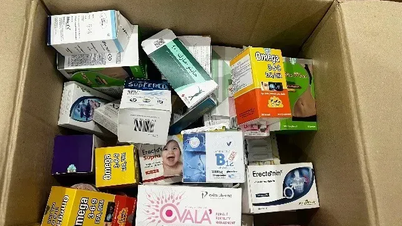The Ministry of Health has officially launched an online training course to pilot a medical incident reporting toolkit, an important step in ensuring patient safety.
Ministry of Health pilots online medical incident reporting toolkit
The Ministry of Health has officially launched an online training course to pilot a medical incident reporting toolkit, an important step in ensuring patient safety.
 |
| According to statistics from the World Health Organization, an estimated 134 million medical incidents occur each year in hospitals in low- and middle-income countries, leading to 2.6 million deaths, of which about half are preventable. |
With more than 170 million outpatient visits and over 10 million inpatient visits each year, the Vietnamese healthcare sector faces many challenges.
Despite the best efforts of medical staff, hospitals are still places where medical incidents and professional errors are potentially present. Therefore, the implementation of an online medical incident reporting toolkit is an important step, not only helping to improve the quality of medical examination and treatment but also ensuring absolute safety for patients.
According to Dr. Ha Anh Duc, Director of the Department of Medical Examination and Treatment Management, Vice Chairman of the National Medical Council, although the health sector always tries to do its job well, hospitals are still places with many potential risks.
With a large number of patients, millions of visits each year, doctors and medical staff cannot avoid errors in the treatment process. This shows the need for a tool to help report and handle medical incidents promptly, thereby ensuring patient safety.
One of the highlights of this toolkit is its ability to collect data and analyze medical incidents, thereby providing effective preventive measures.
Hospitals will be able to rely on this data to identify and diagnose professional errors, thereby minimizing possible incidents.
According to statistics from the World Health Organization, an estimated 134 million medical incidents occur each year in hospitals in low- and middle-income countries, leading to 2.6 million deaths, of which about half are preventable.
Dr. Ha Anh Duc also emphasized that when faced with a medical incident, hospital leaders need to quickly grasp the problem and have timely solutions.
This toolkit will help hospitals and the Department of Medical Examination and Treatment quickly identify incidents and work with experts to find the most effective solutions. Thereby, improving the quality of medical incident reporting will help reduce professional errors and ensure patient safety.
Dr. Nguyen Trong Khoa, Deputy Director of the Department of Medical Examination and Treatment Management, shared that serious medical incidents that are not handled properly will cause serious consequences.
This can lead to a loss of patient confidence in the medical profession, damage to the hospital's reputation, and even legal action. If not dealt with promptly, a medical incident can become a media "bomb" that can make the situation worse.
Therefore, hospitals need to proactively prepare plans to handle incidents in advance. This includes assessing potential risks in the medical care process, establishing rapid response teams to handle incidents when they occur, and developing detailed procedures for specific situations. Furthermore, when incidents occur, hospitals need to be transparent, provide clear information to patients and their families, admit mistakes if there are errors, and commit to remedying the consequences.
In order to raise awareness and skills in handling medical incidents, the Department of Medical Examination and Treatment has organized two pilot training courses on the medical incident reporting toolkit and patient safety risk management at hospitals in Bac Giang and Ba Ria - Vung Tau provinces in 2024. These training courses have helped medical staff improve their ability to respond to medical incidents, thereby protecting the health and lives of patients.
The implementation of a medical incident reporting toolkit is not only an important step in improving the quality of medical examination and treatment, but also demonstrates the health sector's commitment to protecting patients.
By improving incident handling capacity and building an effective reporting system, the Ministry of Health hopes to minimize medical errors and incidents, protect public health, and maintain patients' strong trust in the Vietnamese healthcare system.
Medical incidents can arise from many different causes, of which the following factors are the main causes such as errors in diagnosis.
Physicians may have difficulty accurately diagnosing a patient's condition, leading to incorrect treatment or delays in providing appropriate treatment.
Medication Misuse: Incorrect prescriptions, incorrect dosages, or unchecked drug interactions can lead to serious consequences for patients.
Lack of preparation in surgery: Surgeries can go wrong without adequate preparation in terms of both medical facilities and medical staff. Lack of post-operative patient monitoring can also lead to serious complications.
Errors in the care process: Errors from the patient care process, such as errors in monitoring the patient's condition, failure to promptly detect danger signs, or poor communication between departments within the hospital.
Medical staffing issues: Hospitals that are understaffed, stressed, or lack training can lead to errors in patient care and treatment.
Medical incidents not only cause serious consequences for the health of patients but also have a great impact on the health sector and the community.
The consequences of medical incidents can include damage to the patient's health and life: Serious incidents can cause permanent disability or death. This not only affects the patient himself but also causes great pain to his family.
Loss of trust in the health system: Medical incidents can reduce the community’s trust in the health sector’s capabilities. When patients and their families no longer trust doctors and hospitals, they will not dare to seek medical treatment.
Financial loss: In addition to health losses, medical incidents can also lead to lawsuits, compensation claims, causing financial losses to hospitals and medical organizations.
Media crisis: When a medical incident occurs, if not handled promptly and effectively, information about the incident can be released to the public, creating a wave of criticism and damaging the reputation of the medical industry.
Source: https://baodautu.vn/bo-y-te-trien-khai-thi-diem-bo-cong-cu-bao-cao-su-co-y-khoa-truc-tuyen-d252650.html


![[Photo] Panorama of the Opening Ceremony of the 43rd Nhan Dan Newspaper National Table Tennis Championship](https://vphoto.vietnam.vn/thumb/1200x675/vietnam/resource/IMAGE/2025/5/19/5e22950340b941309280448198bcf1d9)


![[Photo] Close-up of Tang Long Bridge, Thu Duc City after repairing rutting](https://vphoto.vietnam.vn/thumb/1200x675/vietnam/resource/IMAGE/2025/5/19/086736d9d11f43198f5bd8d78df9bd41)






![[Video] Hanoi proactively implements measures to prevent and combat summer diseases](https://vphoto.vietnam.vn/thumb/402x226/vietnam/resource/IMAGE/2025/5/20/262ca87643ef4b8e88ae1006cbbf3b0f)














![[Photo] President Luong Cuong presents the 40-year Party membership badge to Chief of the Office of the President Le Khanh Hai](https://vphoto.vietnam.vn/thumb/1200x675/vietnam/resource/IMAGE/2025/5/19/a22bc55dd7bf4a2ab7e3958d32282c15)





























































![[VIDEO] - Enhancing the value of Quang Nam OCOP products through trade connections](https://vphoto.vietnam.vn/thumb/402x226/vietnam/resource/IMAGE/2025/5/17/5be5b5fff1f14914986fad159097a677)


Comment (0)